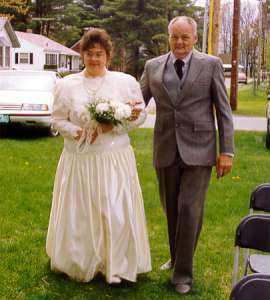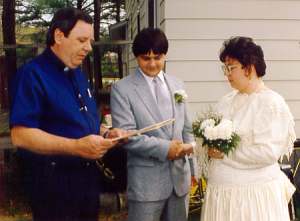

 One of the opportunities you have as an outreach minister is to perform weddings. People
feel very strongly that marriage is the realm of the church, not the State. They want to
be married by somebody they feel is God's representative, is close to God, who will say
prayers for them, and whose prayers will be answered. In addition to this, many couples
want their marriage ceremony to be personalized just for them. In so doing, their wedding
takes on a special meaning that a typical church wedding might not. One of the most common
requests is to have the wedding take place in a home or backyard. The outreach minister
fulfills all of these requirements because of his ability to be both flexible and
spiritual.
One of the opportunities you have as an outreach minister is to perform weddings. People
feel very strongly that marriage is the realm of the church, not the State. They want to
be married by somebody they feel is God's representative, is close to God, who will say
prayers for them, and whose prayers will be answered. In addition to this, many couples
want their marriage ceremony to be personalized just for them. In so doing, their wedding
takes on a special meaning that a typical church wedding might not. One of the most common
requests is to have the wedding take place in a home or backyard. The outreach minister
fulfills all of these requirements because of his ability to be both flexible and
spiritual.
The first step is to find out what the laws are regarding marriages in the state in which you live. If you fail to meet all of the requirements of the law, the marriage is not legal. The best place to get this information is at your town clerk's office. They probably have an FAQ sheet that will answer all of your questions. Make sure you're qualified to perform a wedding ceremony. Also, find out what you need to do to fill out and return the marriage license. Finally, check with your bishop the see if your church or denomination imposes any additional requirements not demanded by the State. For example: Some churches require the presence of two witnesses at a wedding even though the State requires none.
NOTE: Don't be surprised if your state doesn't require you to register with them before you perform a wedding. Many states don't.
Before we go any further, we need to understand how a wedding works from the State's point of view. In order for a couple to be married, they must meet certain requirements. When they have met all the requirements of the State, they are married. Somebody has to examine and be a witness to the fact that all of the requirements have been met. That someone is called the official witness and is the person who performs the marriage ceremony. When the official witness is satisfied that the couple has met all of the requirements of the law, he certifies this on the marriage license, which is sent back to the town clerk's office were the marriage is registered. The marriage isn't sealed by the saying of some magic words like "I now pronounce you man and wife". Only the signiture of an authorized person on the marriage license, properly and timely filed at the county clerk's office, makes the marriage official.
The legal requirements that must be met for a couple to be married consist only of the essentials. In Nevada, you can get married at a drive up window as easily as ordering a burger and fries at McDonald's. So little is required by State law that there's plenty of opportunity for religious and personal embellishments.
As ministers, we want to give couples more than the scant essentials. We want to give them a wedding that is memorable, meaningful, and gives them an opportunity to be drawn closer to our Lord. That's why couples have asked us to perform the marriage ceremony instead of going to a Justice of the Peace. We need not be shy.
By offering couples a choice of several different wedding ceremonies, you open the door of conversation. For the wedding couple, it gives them an opportunity to personalize the wedding and take an active role in deciding what the ceremony should be like. For the minister, this conversation, hopefully, will let you share the importance of having Jesus Christ be central in their lives and in their marriage.
Three wedding ceremonies are linked to this page - SIMPLE, MODERN, and TRADITIONAL. The SIMPLE wedding is a good choice for couples who want a small wedding where there are few guests and the bride will not be given away. Couples previously married are good candidates for this type of ceremony. The MODERN wedding is more traditional but has a more contemporary tone to it. The TRADITIONAL wedding is more flowery and is the type of a wedding you'd expect to have if you were getting married in a traditional denominational church.
NOTE: These three wedding ceremonies are not copyrighted and may be freely used and altered. You may also download the Microsoft WordŽ document files from our DOWNLOAD. These files have been saved in RFT format and should easily load into most popular word processors. Our DOWNLOAD site also has a Dedication Ceremony for a new born baby that you can download too. Then, you'll be ready for the day that the couple starts their family and asks you back.
No two weddings are alike. Every ceremony must be tailored to suit the specific needs of the wedding couple. Sometimes the bride will be given away, sometimes not. The wedding couple may want some of their friends to actively participate in the ceremony by being readers. After the scripture readings, you might want to give a short talk. They may want to have a favorite song play during the ceremony and a place must be made for this. Couples sometimes want to write their own vows. If so, you should review their vows to make sure they're suitable.
There are several parts to a wedding. Not all are required but certain elements must be present for the wedding to be lawful. Remember that the minister is the official witness. That is his first obligation. Unless certain things are done in his presence, he has no way of knowing if all of the requirements of the law have been met so he may declare the couple married by virtue of his signiture. Other parts of the wedding ceremony may serve the requirements of the church, be part of tradition, or just help to make for a more memorable occasion. Below, each element is reviewed to help you understand what is going on and why.
 PROCESSION:
The march of the bride down the aisle to her husband-to-be is traditional and symbolic. It
is visually striking, sobering, and sets the tone of the wedding immediately in ways a
thousand words cannot describe.
PROCESSION:
The march of the bride down the aisle to her husband-to-be is traditional and symbolic. It
is visually striking, sobering, and sets the tone of the wedding immediately in ways a
thousand words cannot describe.
GREETING: The wedding should begin by announcing the purpose of the gathering. Like the procession, the greeting also helps set the tone of the wedding. The atmosphere is charged with electricity. This is what is missing from a simple civil ceremony and totally absent from the drive up window in Nevada. This is why the couple chose you to marry them. You owe it to them and their guests to make the most of this moment.
PRESENTATION OF THE BRIDE: It's important to many brides that they be given away. It implies permission on the part of the bride's family to marry the groom. The bride is presented at this point in the ceremony to solve a logistical problem, which is to get the person who is giving her away seated while getting the bride and groom together in front of the minister.
CHARGE TO THE COUPLE: The greeting usually ends with the charge to the couple and those present. This part is required by law. The purpose of the charge is to determine if the couple may lawfully be married. The statement by the couple that they may lawfully be married and the lack of any objection from those in attendance is sufficient to satisfy you, the official witness, that the proposed marriage is lawful.
WILLINGNESS: The couple is now questioned about their intentions. This, too, is required by law. Two things need to be established to the satisfaction of the official witness. First, that both have made their decision to marry the other of their own free will. Second, that there is a serious life-long intent for each to love and care for the other.
FREE FORM: It's up to the couple what they would like to do here. Scriptures readings not only help to keep the ceremony focused on the spiritual, but also lets some of the couple's friends take an active role in the wedding. Use one reading from the Old Testament, the New Testament, and the Gospels. Most traditional worship services follow this pattern - such as in the Catholic Mass. Consider using Genesis 2:21-25, Mark 10:6-8 and 1 Cor 13:4-7. It is a common practice for the minister to give a talk after the scripture readings. This is a wonderful opportunity to share the joy of the Lord as you share in the joy of the day. If the wedding couple wants a favorite song played, a good time to do this is after the readings and your talk but before the vows.
 VOWS: The marriage vows are the last required element of the
wedding. The vows are a legally binding verbal contract or covenant. Each person promises
to care for and totally give themselves to the other, solely and exclusively, regardless
of the circumstances, for as long as they both live. As the official witness,
you must be satisfied that the vows clearly and unequivocally state this. There are many
ways of wording this but, when you boil it all down, this is what the vows really mean.
VOWS: The marriage vows are the last required element of the
wedding. The vows are a legally binding verbal contract or covenant. Each person promises
to care for and totally give themselves to the other, solely and exclusively, regardless
of the circumstances, for as long as they both live. As the official witness,
you must be satisfied that the vows clearly and unequivocally state this. There are many
ways of wording this but, when you boil it all down, this is what the vows really mean.
BLESSING OF THE RINGS: The wedding rings are important symbols. After the rings are prayed over, the person giving the ring makes a pledge to the person receiving the ring. This underscores the fact that the rings are more than just ornaments. The wedding rings serves as a reminder to all - including the wearer - that someone has pledged their life and love to that person.
PRAYER AND BENEDICTION: Now we pray over the couple and ask God to strengthen their marriage and help them keep the commitment they've made to each other. The community is encouraged to give the couple any assistance they need to build and strengthen their marriage, and there is a stern warning to those who might try to destroy it.
Pronouncing the couple husband and wife is an important formality. The statement tells all present that the couple has presented you with all you need to see, hear, and know, to determine that they have met all of the requirements of the laws of man and God, and are, therefore, husband and wife.
The first kiss of the couple as husband and wife is like the pounding of a gavel. It marks the end of the ceremony and the beginning of a new life together. It's a wonderful tradition.
All content on this page is copyright 1997-2015 by Lance Micklus.